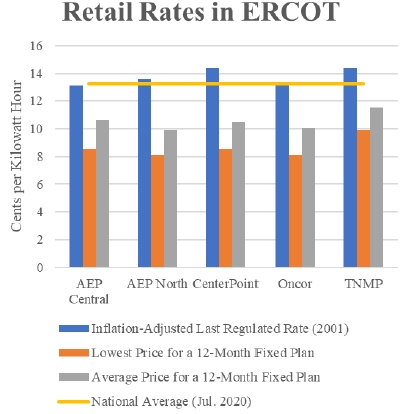|
|
|
|
|
Texas PUC Staff Propose That Legislature Clarify That An EV Charging Station Is Not A Retail Electric Provider
The following story is brought free of charge to readers by EC Infosystems, the exclusive EDI provider of EnergyChoiceMatters.com
Staff of the Public Utility Commission of Texas have filed an updated draft to the electric scope of competition report which now includes Staff's proposed legislative recommendations, including a recommendation that the Legislature clarify that an electric vehicle charging station is not an electric utility or retail electric provider.
"The emerging market of electric vehicle charging stations has highlighted a new need for regulatory clarity on the type of sale that is made by the electric vehicle charging station to the customer charging an electric vehicle," the Staff draft states
"Given the essential nature of electric service, the Utilities Code and PUCT rules prescribe extensive customer protections for service from retail electric providers and electric utilities in the areas outside competition. These protections are premised on the paradigm of the customer selecting a single retail electric provider to supply electricity to a fixed location," the Staff draft states
"A long-term relationship exists between the retail electric provider and the customer, analogous to a wireless telephone agreement. In contrast, an electric vehicle owner makes a new decision each time a vehicle needs to be charged away from home. The transaction between the charging station and the customer is of short duration and does not obligate the customer to a long-term service contract with the charging station. If the customer does not wish to purchase from a given charging station again, then the customer is under no obligation to do so. The short-term relationship between the customer charging an electric vehicle at a commercial charging station and the charging station itself does not warrant the same treatment as the long-term provision of service to a home or business," the Staff draft states
The staff draft recommends that, "The PUCT proposes that the Legislature clarify that the use of an electric vehicle charging station does not constitute a sale of electric energy to a retail customer and that an electric vehicle charging station is not an electric utility or retail electric provider. These changes will provide regulatory certainty and consistency across the state, in areas inside and outside competition, to facilitate deployment of electric vehicle charging stations for customers."
"Similar to the vehicle-charging paradigm is a service in which electric service equipment is brought to a fixed location for temporary use. For example, a generator might be rented for use at a construction site. Market economics would dictate that this transaction be priced on the wear-and-tear to the equipment, rather than a daily or weekly fee. For this reason, the decision by the business to charge by the kilowatt-hour should not dictate that the transaction constitutes a retail sale of electricity. The PUCT proposes that the Legislature clarify that supplying electric service equipment using a kilowatt-hour pricing mechanism does not constitute a sale of electric energy to a retail customer and that such a supplier is not an electric utility or retail electric provider," the Staff draft states
Authorization For PUCT To Direct Penalty Amounts To Benefit Customer Assistance
The Staff draft also recommends that the Legislature authorize the ability of the PUC to direct that a portion of a penalty levied on an entity (such as a retail electric provider) be directed to a third party entity approved by the PUCT (such as a fund for customer assistance)
The Staff draft noted that Section 15.023 of the Texas Utilities Code authorizes the PUCT to impose a penalty against a person regulated under the Code who violates the Code or a rule or order adopted under the Code, and further prescribes that the PUCT consider a number of factors in determining the penalty, including, "the economic harm to property or the environment," and, "the amount necessary to deter future violations."
Under Section 15.027(a) of the Texas Utilities Code, an administrative penalty assessed by the PUCT must be paid to the comptroller. Such payments may deter future violations but do not directly address economic harm to property or the environment, the Staff draft notes.
"For this reason, parties have in recent years reached settlements in which the regulated entity, in addition to paying an administrative penalty, also agrees to make a contribution to a fund that specifically assists the affected class of customers. For example, a retail electric provider that did not properly notice customers of a change in prices might contribute to a third-party agency that provides bill payment assistance to customers," the Staff draft notes
"The PUCT proposes that this tool be formalized by allowing a portion of an administrative penalty to be directed to a third party entity approved by the PUCT. Such a program would operate in a manner similar to Supplemental Environmental Projects (SEPs), as authorized by Texas Water Code Section 7.067," the Staff draft notes
During a recent open meeting, Commissioners had discussed the issue of customer refunds or restitution in complaint proceedings and/or broader enforcement proceedings. Commissioner Arthur C. D'Andrea had noted that while the Commission may be able to provide restitution to an individual complainant in a contested complaint case, to the extent the behavior was not specific to an individual customer, it feels "strange" to only provide relief to an individual petitioner whose complaint includes a request for relief (and therefore opens an avenue to provide restitution to such specific customer), since penalty amounts otherwise arising from the proceeding are currently required to be directed to the state's general revenue.
During such discussion, the PUC's director of Office of Policy and Docket Management suggested that the specter of administrative penalties is a powerful tool to get parties to agree to various terms, which could include restitution funds. However, to the extent the respondent is not amenable to settlement, such an approach would not resolve the current situation with respect to the disposition of penalties.
Other Issues
The Staff draft also recommends that the Legislature authorize the PUCT to set fees for filing certain documents at the Commission
"A predominantly electronic system for accepting filings has numerous benefits for both the agency and outside parties. However, there are instances in which paper copies are necessary for PUCT staff and Commissioners to analyze a filing. Many such filings are voluminous, consisting of hundreds and sometimes thousands of pages. Therefore, cost shifting from companies and other parties to the agency is a concern. To offset this cost, the PUCT recommends that it be granted statutory authority to charge fees to certain parties that make filings with the PUCT. The filing fee would be set at a level not to exceed the costs incurred by the agency," the Staff draft recommends
As contained in an earlier draft, the updated draft notes that, since 2002, rates in the ERCOT competitive market have decreased by 31% when adjusted for inflation.
The revised draft includes a re-formatted chart that showed the same information as the chart from the original draft shown below:
Comparison of Currently Available Retail Rates in ERCOT to the National Average and Inflation-Adjusted Last Regulated Rate
Project 50475
ADVERTISEMENT Copyright 2010-20 Energy Choice Matters. If you wish to share this story, please
email or post the website link; unauthorized copying, retransmission, or republication
prohibited.
December 11, 2020
Email This Story
Copyright 2010-20 EnergyChoiceMatters.com
Reporting by Paul Ring • ring@energychoicematters.com

NEW Jobs on RetailEnergyJobs.com:
• NEW! -- Sr. Power Analyst -- Houston
• NEW! -- Supply Analyst -- Retail Supplier -- DFW
• NEW! -- Lead Data Analyst
-- Retail Supplier
• NEW! -- IT Billing Project Manager
• NEW! -- IT Billing Business Analyst
• NEW! -- Senior Energy Pricing Analyst
• NEW! -- Senior Energy Advisor
• NEW! -- Financial Analyst -- Retail Supplier -- DFW
• NEW! -- Sr. Energy Intelligence Analyst
• NEW! -- Channel Partner Sales Manager -- Retail Supplier
• NEW! -- Sr. Billing Analyst -- Retail Supplier
• Director of Regulatory Affairs -- Retail Supplier -- Houston
|
|
|
|









